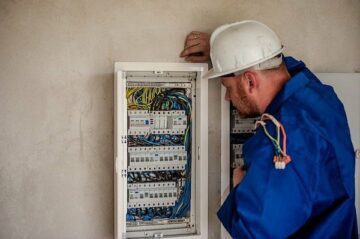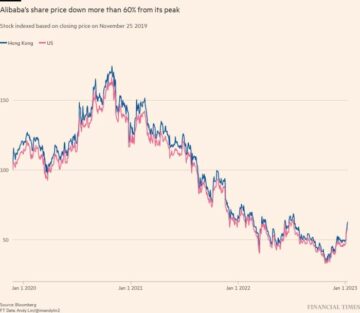
Apple has started hiring retail store workers in India and posted plans to fill many other roles as it prepares to open its first flagship locations in the world’s second biggest smartphone market as soon as this quarter.
On Friday, Apple’s career page listed openings for 12 different job functions it seeks to fill in “various locations within India,” including technical specialist, business expert, senior manager, store leader and “genius”.
Many of the job descriptions refer directly to flagship retail operations. “The Apple Store is a retail environment like no other — uniquely focused on delivering amazing customer experiences,” says one.
The 12 listings imply hundreds of job openings, as a typical Apple Store has at least 100 employees and flagship locations can have up to 1,000 workers.
Some of the functions on Apple’s website, such as “market leader,” describe managing teams “across Apple Stores,” implying several locations are in the works beyond the widely reported 22,000 square foot location set to open in Mumbai as early as March.
Separately, at least five employees in Mumbai and New Delhi have announced on LinkedIn they have been hired for the yet-to-be-announced stores. One announced they had been named “Lead Genius” — a customer-facing tech-support role — while another said she had been named a senior manager. Apple’s head of recruiting in India, Renu Sevanthi, “celebrated” several of the announcements on the social networking site.
Apple, which did not immediately comment, has not confirmed plans to open its first stores in the country. But in February 2020 CEO Tim Cook told investors Apple Store would expand to India the following year, saying he was not content to leave retail sales to franchise partners. “I don’t want somebody else to run the brand for us,” Cook said at the 2020 annual shareholders meeting.
Later that year Apple launched its online store for India, greeting online shoppers with “Namaste”, but physical stores have failed to emerge.
The expansion would be important for Apple as it attempts to diversify manufacturing from China and give momentum to its nascent production operations in India. Supply chain experts say Apple has a “silicon to storefront” ambition of controlling all aspects of the customer experience — from Apple-designed chips in its phones to Apple Store retail clerks.
“The stars are finally aligning for Apple in India,” said Neil Shah, analyst at Counterpoint, a market intelligence group.
Cook personally visited and met with Prime Minister Narendra Modi in 2015, reportedly lobbying to open an Apple Store in the country. But protectionist rules require that foreign companies selling goods directly to consumers must source 30 per cent of components locally.
However, the rules have been relaxed in recent years, and in 2017 Apple suppliers began assembling iPhones in India. This allowed it to avoid 22 per cent tariffs, which helped to buoy sales. New Delhi has since given incentives to smartphone makers to shift more production to the country, resulting in major investments from Taiwanese contract manufacturers Foxconn, Wistron and Pegatron.
India’s Tata Group, which makes casings for iPhones in the southern state of Tamil Nadu, plans to scale up its operations to provide a broader range of components for Apple, according to three people familiar with its plans, on which the Indian industrial group has not commented.
Last year, about 200mn smartphones were made in India, ten times the number assembled in 2014, according to Counterpoint. And while Apple’s market share in India is just 5 per cent, it is growing quickly and leads the premium segment with two-fifths of all sales.
“Since the pandemic, the number of iPhones sold in India has almost doubled,” said Shah. “That’s driving sales of Macs, Apple Watches and iPads. There’s a positive network effect. So Apple is noticing this fast-growing market, and now is the right time to enter, to invest.”
Shah said that by the end of this year, Apple India is expected to have a four-layer sales strategy in place.
This would comprise ecommerce sales, at least two flagship stores in its most affluent cities, 10 or more other stores in potential partnership with Tata, in tier-one and tier-two cities, as well as growing “store within a store” partnerships with big box retailers across the country.
Additional reporting by John Reed in New Delhi
<!–
–>
- SEO Powered Content & PR Distribution. Get Amplified Today.
- Platoblockchain. Web3 Metaverse Intelligence. Knowledge Amplified. Access Here.
- Source: https://blockchainconsultants.io/apple-hires-workers-in-india-as-it-looks-to-open-first-flagship-stores/?utm_source=rss&utm_medium=rss&utm_campaign=apple-hires-workers-in-india-as-it-looks-to-open-first-flagship-stores
- 000
- 1
- 10
- 100
- 2014
- 2017
- 2020
- a
- About
- According
- across
- All
- amazing
- ambition
- analyst
- and
- announced
- Announcements
- annual
- Another
- Apple
- aspects
- assembled
- Attempts
- began
- Beyond
- Big
- big box
- Biggest
- Box
- brand
- business
- Career
- ceo
- chain
- Chips
- Cities
- comment
- commented
- Companies
- components
- CONFIRMED
- Consumers
- content
- contract
- controlling
- counterpoint
- country
- customer
- customer experience
- dc
- Delhi
- delivering
- describe
- description
- DID
- different
- directly
- diversify
- Dont
- doubled
- driving
- Early
- ecommerce
- effect
- employees
- Enter
- Environment
- Expand
- expansion
- expected
- experience
- Experiences
- expert
- experts
- Failed
- familiar
- February 2020
- fill
- Finally
- First
- flagship
- focused
- following
- Foot
- foreign
- Foxconn
- Franchise
- Friday
- from
- FT
- functions
- Give
- given
- goods
- greeting
- Group
- Growing
- head
- helped
- hires
- Hiring
- HTTPS
- Hundreds
- immediately
- important
- in
- Incentives
- Including
- india
- Indian
- industrial
- Intelligence
- Invest
- Investments
- Investors
- IT
- Job
- John
- launched
- leader
- Leads
- Leave
- LINK
- Listed
- Listings
- lobbying
- locally
- location
- locations
- LOOKS
- made
- major
- Makers
- MAKES
- manager
- managing
- Manufacturers
- manufacturing
- many
- March
- Market
- meeting
- Momentum
- more
- most
- Mumbai
- Named
- narendra modi
- nascent
- network
- networking
- New
- number
- ONE
- online
- online store
- open
- openings
- Operations
- Other
- pandemic
- partners
- Partnership
- partnerships
- pegatron
- People
- Personally
- phones
- physical
- Place
- plans
- plato
- Plato Data Intelligence
- PlatoData
- positive
- posted
- potential
- Premium
- Prepares
- Prime
- prime minister
- Production
- provide
- Quarter
- quickly
- range
- recent
- recruiting
- Reported
- Reporting
- require
- resulting
- retail
- Retail Sales
- retailers
- Role
- roles
- rules
- Run
- Said
- sales
- Scale
- Second
- Seeks
- segment
- Selling
- senior
- set
- several
- Share
- Shareholders
- shift
- Shoppers
- since
- site
- smartphone
- smartphones
- So
- Social
- Social networking
- sold
- Soon
- Source
- Southern
- specialist
- square
- Stars
- started
- State
- store
- stores
- Strategy
- such
- suppliers
- supply
- supply chain
- tariffs
- teams
- Technical
- ten
- The
- this year
- three
- time
- times
- to
- typical
- us
- visited
- W3
- watches
- Website
- which
- while
- widely
- within
- workers
- works
- world’s
- would
- year
- years
- zephyrnet












